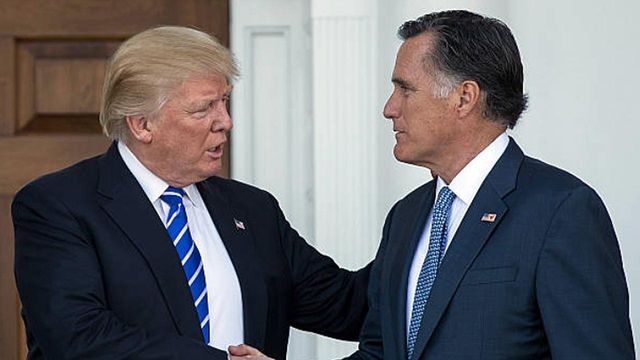Does Mitt Romney's op-ed even matter?
There's a tendency to assume Mitt Romney's op-ed critical of President Donald Trump is a big deal.
Posted — UpdatedAfter all, Romney not only was the party's 2012 presidential nominee but is also set to become a senator from Utah this week. And what he wrote was deeply critical of the way in which Trump has approached the presidency. Of Trump, Romney wrote: "His conduct over the past two years, particularly his actions this month, is evidence that the President has not risen to the mantle of the office."
The Romney op-ed, which ran in The Washington Post, got A LOT of attention -- as he (and we) knew it would. And Trump responded -- "Here we go with Mitt Romney, but so fast!" -- as he (and we) knew he would.
It was all a Very Big Deal.
But here's the thing: I am very skeptical that any of this matters at all -- in terms of how Trump conducts himself and/or how the elected Republican leaders in Washington interact and react to him.
The first observation is patently obvious to anyone who has watched Trump's presidency -- or his life. He is who he is. The chances a 70+-year-old man who is currently the President of the United States changes his approach to life because a politician who has long been a critic writes an op-ed are, roughly, 0%.
If you need proof of that -- and if the first two years of Trump's presidency aren't proof enough -- simply look to his tweeted response to Romney's op-ed -- in which he urges the soon-to-be Utah senator to "be a TEAM player & WIN!"
The second thought -- that Romney's op-ed will change nothing about how Republican senators and House members interact with Trump -- is also based on recent observations.
Take Romney. Yes, he was the most high-profile critic of Trump -- at least among those Republicans not running against him -- during the 2016 primary race. Romney gave a speech during the spring of 2016 in which he blasted Trump, saying, among other things, that "dishonesty is Donald Trump's hallmark."
And yet, after Trump won, Romney met with him when the President was apparently weighing naming the former Massachusetts governor as secretary of state. While Romney was occasionally critical of Trump during the 2018 Senate campaign, he said and did nothing even close to as overt as this Post op-ed when it could have hurt him electorally.
Romney's record of opposition to Trump is not entirely consistent, to put it nicely. Who's to say that he will keep it up for the next two years (or longer)?
Even if Romney does keep it up, there's reason for skepticism that his critique of Trump's approach to the presidency will have any actual impact on his colleagues. Over the past two years, Trump had several prominent Republican critics in the Senate -- Jeff Flake, John McCain and Bob Corker being the three best known. This is not a thank-God-someone-finally-said-it! sort of moment.
Flake was driven into retirement by his anti-Trump views. Corker's political strength was affected as well, and he decided not to run again. McCain, afflicted with terminal brain cancer, passed away last year.
And for all of their speaking out and appealing to the better angels within their colleagues' hearts and minds, Flake, McCain and Corker had zero measurable impact on rallying the Senate (or the House) against Trump.
If anything, they served as examples of what not to do -- challenge Trump and watch your base run away from you, never to come back.
The Republican Party -- as reflected by its elected officials in the House and Senate -- became more pro-Trump between the end of 2016 and the end of 2018. It did so for a variety of reasons, the main ones being: 1) to accomplish long-standing goals like a major tax cut or the confirmation of a slew of judges from the Supreme Court on down 2) to survive politically.
The belief that op-eds like Romney's might change things within the Republican establishment are, therefore, based on a false premise: That there is any sort of measurable Republican Party outside of those who align with Trump.
There is not. The 2018 election showed that. The path to victory for Republican candidates -- particularly in GOP primaries -- was to get as close to Trump as possible and never let go. Distancing yourself from the President was a recipe for Republican disaster.
Romney's op-ed is then rightly understood not as a political earthquake but as a lone scream into the void. Sure, Trump has flatly rejected the idea of the presidency as a position of moral leadership. And yes, his policies are a clear break from what the GOP stood for even a few years ago.
But the idea that an op-ed will change how Romney's soon-to-be Republican colleagues will act toward Trump between now and the 2020 election is a total and complete fallacy. That ship sailed a long time ago. And no words written in a Washington Post op-ed are going to bring it back into harbor.
Related Topics
• Credits
Copyright 2024 by Cable News Network, Inc., a Time Warner Company. All rights reserved.





